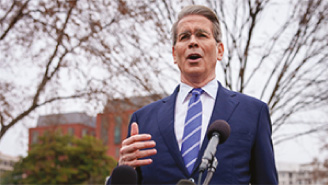Treasury Secretary Scott Bessent accuses the criminal group of trafficking fentanyl and other lethal drugs from Mexico to the US.
by the El Reportero‘s staff
The US Treasury Department sanctioned and blocked the assets of individuals and companies on Monday allegedly involved in a money laundering network serving the Sinaloa Cartel, one of the most violent and powerful drug trafficking organizations in the world, recently designated a “Foreign Terrorist Organization” by the Trump administration. With this designation, the US government toughens its stance against the cartel, allowing for more severe sanctions and expanding cooperation with international agencies to combat its financial and logistical operations. In a statement, it was reported that the measure was carried out by the Office of Foreign Assets Control (OFAC), in collaboration with the Government of Mexico and its Financial Intelligence Unit, as well as the Attorney General’s Office for the Southern District of California, the Drug Enforcement Administration (DEA), and the FBI, among other US agencies. These actions are part of a broader strategy to stem the flow of illicit money that fuels organized crime operations in both countries.
“Drug trafficking proceeds finance the Sinaloa Cartel’s narco-terrorist activity and are only possible thanks to financial operators like those sanctioned today,” stated Treasury Secretary Scott Bessent. The report also attributes to the criminal group a large portion of the illicit fentanyl and other lethal substances reaching the US, exacerbating the opioid crisis that has devastated entire communities in recent years. The US government has reiterated on multiple occasions that combating this illegal trafficking is a national security priority. Among those sanctioned are six individuals: Alberto David Benguiat Jiménez, Christian Noé Amador Valenzuela, Israel Daniel Páez Vargas, Salvador Díaz Rodríguez, Enrique Dann Esparragoza Rosas, and Alan Viramontes Sesteaga. They allegedly operate in Mexicali, Culiacán, and California, participating in extortion schemes and managing front companies to launder illicit proceeds. These individuals have been identified as key players in the cartel’s financial infrastructure, facilitating the conversion of enormous sums of money into seemingly legitimate assets that are then reinvested in the expansion of its criminal activities.
Likewise, seven companies used for money laundering were identified: Grupo Unter Empresarial, Grupo Vindende, Grupo Zipfel de México, Productions Pipo, Personas Unidas Hoas, Scatman & Hatman Corp, and Tapgas México. According to OFAC, these companies have been used to hide and move money derived from drug trafficking, employing complex international transaction networks to avoid detection by authorities. With these sanctions, the US freezes the assets and property of the aforementioned individuals and companies, even if they are controlled by US citizens. Similarly, any entity in which those implicated own a 50 percent or more stake will be subject to the measure, unless OFAC grants a specific license or exemption. These restrictions significantly hamper the cartel’s access to global financial systems, limiting its ability to move money and continue expanding its illicit operations.
“Today’s action is part of a government strategy to counter the illicit drug crisis in the US, which causes more than 100,000 deaths annually and an untold number of non-fatal overdoses,” the Treasury added. US officials have insisted that this crisis not only represents a public health problem, but also a threat to the country’s social and economic stability. In this context, the Government seeks to strengthen cooperation with Mexico and other nations to dismantle these criminal networks and prevent them from continuing to operate with impunity. With reports by RT.



